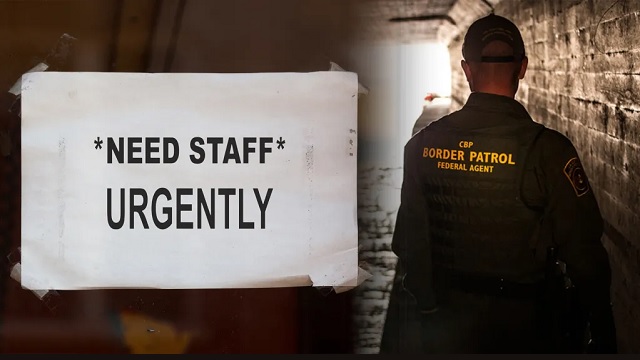Help Wanted: Law Enforcement Staffing Challenges at the Border

In May, FAIR wrote about a newly released report by the Inspector General for the Department of Homeland Security that raised red flags about the “unsustainable” methods of staffing at Customs and Border Protection (CBP) and Immigration and Customs Enforcement (ICE) and their impact on morale. In response to that report, the House Committee on Oversight is holding a hearing Tuesday with the sole witness being the Inspector General. The hearing will “examine the current management of law enforcement resources and highlight how the Biden Administration’s policies have catalyzed the crisis at the southern border.”
According to the Inspector General, the dramatic increases in border encounters, have magnified existing “staffing challenges” at CBP and ICE. The Inspector General, therefore, conducted an audit to determine: (1) whether CBP and ICE are properly managing law enforcement staffing resources; and (2) the turnover rates for CBP and ICE, and whether the agencies have an effective plan to replace departing officers.
Overall, the Inspector General found that CBP’s and ICE’s workloads “have outpaced their current staffing” and described the agencies’ current management of staffing needs as “unsustainable.” The workload has grown tremendously, the IG wrote, yet despite the greater workloads, “staffing levels have remained the same.
The IG also pointed out that the flow of migrants and traffic into the U.S. has far outpaced the number of CBP and ICE agents, which has consistently hovered around the number authorized by Congress.
The IG warned that “[u]nless CBP and ICE assess and make strategic changes to how they manage staff at the border…heavier workloads and low morale may lead to higher turnover rates and earlier retirements among these employees.” This could further worsen staffing challenges along the southern border and impede CBP’s and ICE’s ability to carry out their missions.
Sadly, many agents and officers also told the Inspector General that the priorities at work had changed. Officers at six ports of entry told the IG that CBP leaders prioritized “maintaining the flow of traffic and minimizing wait times” over security. Border patrol agents at two different stations told the IG that they felt pressure to process and release migrants as quickly as possible to move them out of the facilities. Nearly half of CBP respondents and over half of ICE respondents said they had to take on additional work outside their traditional responsibilities.
In addition, 20 percent of CBP agents said they felt unable to perform their primary law enforcement duties of securing the border. One border patrol agent said that all of the manpower in his station was being delegated to do processing instead of deterring or apprehending illegal aliens. A combined 24 percent of CBP and ICE respondents said they plan to leave their agency within the next year.
The IG also explained in detail how overtime was typically forced on agents, rather than being voluntary. This resulted in many agents working double shifts and, over the course of a year, several extra weeks of work. Some agents told the IG that they had reached the statutory limit for how much overtime they could submit early in the year.
Finally, the IG noted that the change in immigration policies during the Biden Administration has also hurt morale at the agencies.
“Since FY 2019, immigration policies have shifted significantly as the United States experienced the COVID-19 pandemic and transitioned from one administration to another….Our interviews and survey comments showed staff frustration and lower morale related to changing policies, especially when the respondents felt the changes were inconsistent with their law enforcement duties. In the view of some law enforcement personnel, these policies have made it difficult for them to enforce the laws and carry out their mission; one said they felt as if they were doing their job “with one hand tied behind [their] back.”
While the IG gave credit to the Department of Homeland Security for taking some proactive steps to mitigate the situation, the Inspector General made three recommendations. The recommendations focused on better coordination with experts around staffing needs, reviewing actions to determine if efforts are working, and better communicating with frontline staff about duties and responsibilities.
The Biden Border Crisis is not only affecting families and communities from the border to the interior of the country, but it’s affecting the men and women who make sacrifices to protect the border and secure our nation. Today’s hearing is an opportunity for members of Congress to get at the bottom of the DHS workforce crisis, to ask the Inspector General more in-depth questions about his audit, and encourage accountability from the Secretary of Homeland Security.
*To watch the Committee on Oversight hearing, visit their website here.
© COPYRIGHT 2023 FEDERATION FOR AMERICAN IMMIGRATION REFORM, ALL RIGHTS RESERVED.
RELATED TWEET:
At 2 am this morning, I visited the border outside of Yuma, Arizona where thousands of migrants are crossing the border each week. You have to see it with your own eyes. #Kennedy24 pic.twitter.com/Fbl4mPr44A
— Robert F. Kennedy Jr (@RobertKennedyJr) June 6, 2023


Leave a Reply
Want to join the discussion?Feel free to contribute!